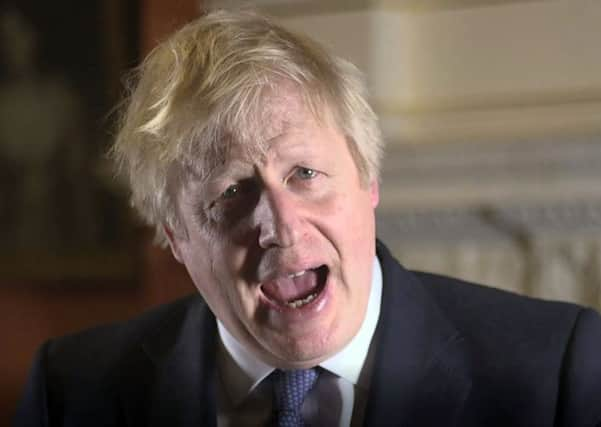Bill Jamieson: Blue skies from now on, but sunshine may prove elusive


The grounds for positivity are strong. The spectre of Corbynism has been banished. The Conservatives now have a thumping majority to forge ahead with their economic and fiscal programme. The budget next month is set to kick-start stimulus measures while Boris Johnson’s Svengali Dominic Cummings shakes up the civil service and opens the way for radical change.
The road ahead should now be clear for an upsurge in business investment and expansion as we leave the political clouds behind. But there is seldom a blue sky in the UK’s economic fortunes without evident clouds. It doesn’t mean that the glowing messages of cheer should be dismissed; rather than we need them to be sustained over the next 18 months if we are to overcome some of the daunting challenges that persist.
Advertisement
Hide AdAdvertisement
Hide AdThe most immediate of these is the onset of fresh uncertainty over the outcome of complex trade negotiations with the EU and the doubts that remain over the likelihood of achieving a settlement by the target date of the end of the year. Many economists doubt that a deep and comprehensive free trade agreement can be reached in a few months. But if the transition period is not extended, we will leave on WTO terms with the tariff and non-tariff barriers this entails. Uncertainty here might well continue to hold back capital spending. Thus an upturn in business investment – and a recovery in overseas direct investment in the UK – may need to await a successful outcome of this critical stage in the Brexit process.
There are also many structural obstacles to capital spending, such as a lack of innovation, difficulty of financing investment in intangible assets and the hangover from the post-financial crash period.
Don’t expect too much too soon is the blunt warning from Investors Chronicle economist Chris Dillow. He points out that in the past 50 years, real GDP has fallen in the first quarter of the year by an average of 3.5 per cent. In only seven of these 50 years has it risen. And on average, we don’t see much recovery in the second quarter. Real GDP has grown by an average of only 0.5 per cent in this quarter in the past 50 years. This means that all the economic growth we’ve had in the past 50 years has occurred only in the second half of the year.
There is also a persistent problem with productivity. This is still stagnating, which means real wages can grow only if import prices or profit margins fall. Sterling’s recent rise offers a little hope in this respect.
Meanwhile the retail sector is bracing itself for another brutal January after fewer shoppers visited stores in the run-up to Christmas. A combination of lacklustre sales, heavy price discounting, hefty rent bills and the onward march of Amazon suggest a steady stream of administrations in the opening months of 2020.
The final December Purchasing Managers’ Index for manufacturing in December was disheartening, with only a marginal increase on the “flash” reading earlier in the month. It indicated that manufacturing activity contracted for an eighth month running in December and at the second fastest rate (after August) since July 2012.
The weakness in the December survey was most pronounced in the investment goods sector, where output fell at the fastest rate for 89 months and orders fell markedly, adding to the evidence that businesses continue to hold back on investment. There was also contraction in output and new business in the intermediate goods sector.
The survey added to the overall evidence that the labour market has lost overall momentum since the middle of 2019.
Advertisement
Hide AdAdvertisement
Hide AdHoward Archer, chief economic advisor to the EY ITEM Club, comments: “The final purchasing managers survey of 2019… highlights that the manufacturing sector continues to struggle with both domestic and foreign demand under pressure. Meanwhile, weakened global growth and an uncertain trading environment is weighing down on foreign demand for UK manufactured goods.”
This problematic picture is evident in the latest snapshot of almost 6,500 companies undertaken by the UK Chamber of Commerce. The Prime Minister, it says, needs to kickstart a UK economy in the grip of “prolonged stagnation”. Listless manufacturers, it adds, have suffered falling export business rather than rising order books for two quarters in a row, while domestic orders are also in a sustained decline for the first time since 2011, with investment intentions at an eight-year low.
The message is echoed by Liz Cameron, head of the Scottish Chambers of Commerce. Businesses in Scotland, she warns, “will need to dig deep to embrace the upheavals the coming era brings. Thanks to Brexit, these include an urgent need to internationalise and target new markets for sales and growth. Business and government now must work more closely together than ever as the rules of global trade are being re-written. Business needs to be at the table while they are.”
There are key areas that our parliamentary leaders must address, not least to ensure measures are taken to ensure local authorities aren’t given leeway to create 32 unlevel playing fields for businesses, and that the continual pleas to sort our their rates are urgently actioned.
“Significant aspects of our competitive edge,” she adds, “are in the hands of elected parliamentarians. They must put jobs and business high on their list of policy and operational priorities, committing to a major clamp-down on the rising cost of doing business.”
Thus the upbeat messages from Downing Street need to be tempered with realism about the continuing problems we face – and this at a time when global trade and geo-political tensions will dampen export prospects and Eurozone economies are also struggling to sustain any appreciable growth in the year ahead. For those sunny uplands to materialise, there is much heavy lifting to do.